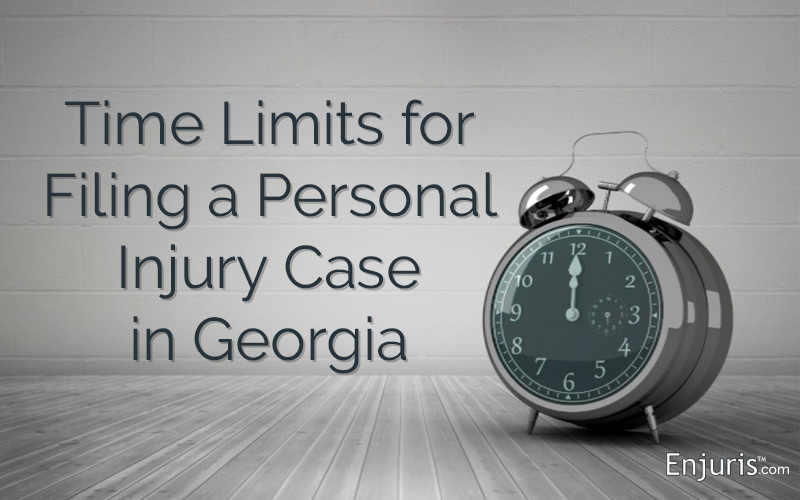
The statute of limitations in Georgia for personal injury claims
Georgia Statutes of Limitation
| Type of Case | Time Limit to File Suit | Georgia Statute |
|---|---|---|
| Personal injury | 2 years | OCGA §9-3-33 |
| Injury to property | 4 years | OCGA §9-3-32 |
| Libel and slander | 1 year | OCGA §9-3-33 |
| Professional malpractice | 2 years, max. of 5 from act | OCGA §9-3-71 |
| Trespass | 4 years | OCGA §9-3-30 |
| Written contracts | 6 years | OCGA §9-3-24 |
| Oral contracts | 4 years | OCGA §9-3-26 |
| Collection of debt on account | 4 years | OCGA §9-3-25 |
| Judgments | 5 years foreign judgment | OCGA §9-3-20 |
Whether slight or severe, a car accident or other type of unfortunate mishap in Georgia can be a highly stressful situation.
You might experience serious pain or cognitive issues. You might be confined to bed rest or not even be allowed to leave the hospital, making work impossible. Your medical bills can start piling up fast and you can’t work. This doesn’t even account for property damage; who’s going to pay for your repairs?
The days, weeks, and months after an accident can be hectic and urgent, so you might feel compelled to file a lawsuit as fast as possible. However, consider these reasons to be cautious about the timing...
How quickly should you file a personal injury claim or lawsuit in Georgia?
The first step you will encounter in your accident recovery journey is whether all of your potential injuries and medical issues have been uncovered.
Settling your accident claim early means that you lose the right to seek any additional damages against the defendant that may arise later on. You should be convinced that everything for which you can seek compensation has been both tallied and addressed.
On the other hand, the statute of limitations in Georgia may be working against you.
Almost any attorney will tell you never to file an injury claim sooner than it takes to assess the potential damages. For instance, if you’re still getting treated for a back injury, you will want to wait until you reach what doctors call “maximum medical improvement” — which basically means you’ve improved as much as you’re going to, and your treatment will hold steady for the foreseeable future. Damages would then include the cost of ongoing treatment.
If you file your personal injury claim too early, that foresight and knowledge is lost.
How long does the statute of limitations in Georgia give you to file a personal injury suit?
In the state of Georgia, you are limited by statute in regard to the deadline for filing an accident claim. This goes for any type of injury against a negligent person, such as a car accident, bike accident, wrongful death, and more.
Under the Georgia Code, § 9-3-33 (2017), a plaintiff (or the victim of the accident) typically has two years to file a claim against the defendant (the person responsible for the accident) for personal injury. Property damage, however, has a statute of limitations of four years, so a crashed car would fall under this category.
When does the Georgia statute of limitations begin?
A case against the defendant must be brought within two years of the date of the incident or accident. If the claim is for an injury to the plaintiff’s reputation (slander or libel, for instance), that limit is shortened to one year. However, wrongful death claims involving loss of consortium (deprivation of familial or spousal benefits) get four years.
Does that mean my entire case has to be resolved within 2 years?
Not at all. You just need to file the claim before two years is up. This announces your intention to the defendant, your insurance company, and the court.
What if I’m suing the state of Georgia?
If you want to pursue a case against a government entity or state employee, you have 12 months to provide them with written notice both to the defendant’s state agency and the Department of Administrative Services’ Risk Management Division. The Georgia Tort Claims Act waives sovereign immunity to the tune of up to $1 million per person and $3 million per occurrence, though there are limitations.
Injury claims against a government entity must name the state agency for which the offending employee works. So, if Joe Defendant is employed with the Georgia Department of Veteran Services and crashes his car into Patty Plaintiff’s car while traveling between meetings, causing damages, Patty may have the option to sue the Department of Veteran Services. This is because of a legal theory called “respondeat superior,” or “let the employer answer,” which holds employers accountable for what their employees do while working.
In such a case, you must name the grounds for your claim, describe what happened, the time and place the accident occurred, the state government entity named in the suit, and the compensation demanded. This notice letter also needs to be attached to the lawsuit filed in court later on.
If you miss any of these steps, your claim will likely be dismissed.
Counties and municipalities have their own stringent filing requirements as well, so this is something you should start thinking about immediately after your injury.
Statute of limitations in workers’ compensation claims
Georgia allows workers’ compensation claims to be filed within one year from the date of injury. There are, of course, some exceptions. This deadline can be determined from the date of injury (one year), from the last medical treatment paid by your employer (one year), or from the last payment of weekly income benefits (two years).
Cases involving occupational diseases also have their own quirks. The statute of limitations in these cases are one year from the date of becoming aware of the illness, or seven years from being exposed to a poisonous toxin. This means that if you develop symptoms more than seven years after exposure, your claims will likely be rejected.
Notice must be provided to your employer within 30 days, or the claim risks being dismissed and you risk losing your benefits.
Timing is everything
You absolutely have the right to seek compensation for damages you’ve sustained after an accident caused by a negligent individual or company. However, you must strike a balance between the requirements of the statute of limitations and the full assessment of your injuries.
A personal injury attorney can help you determine whether you have a case and how soon to file. If you haven’t started looking and are ready to begin, browse Georgia lawyers in the Enjuris directory.
Other resources: General information on the statute of limitations
See our guide Choosing a personal injury attorney.

